
Inflation in the UK was 10.4% in February, the latest data from the Office for National Statistics (ONS) reveals.
February’s figure is up from the 10.1% reported in January but down from a peak of 11.1% in October.
The largest upward contributions came from restaurants and cafes, food, and clothing, partially offset by downward contributions from recreational and cultural goods and services, and motor fuels.
Last month, the Bank of England (BoE) hiked the base rate by 50 basis points to 4% from 3.5%.
The next Monetary Policy Committee (MPC) meeting is scheduled for tomorrow (23 March).
LiveMore managing director of capital markets and finance Simon Webb says the rise in inflation is “disappointing”.
Webb explains that it “remains well above the BoE’s target with high growth in prices, especially in the essentials such as food and energy. The halt on the rise of the energy cap in April for a further three months is welcome but it is only a temporary measure”.
“Markets still expect the Bank of England to raise interest rates in the short term by another 0.25%, although are split between whether that happens in March or May with other global factors at play aside from the war in Ukraine.”
“The emergence of a potential new banking crisis – the collapse last week of Silicon Valley Bank and Signature Bank in the US and Credit Suisse being rescued via a takeover from UBS – doesn’t bode well for the global banking system and adds a further dynamic for central banks to consider when making decisions around interest rates. The question is what impact do all of these factors have on inflation?”
Loan.co.uk chief executive Paul McGerrigan says the inflation increase “sends grave warning signs that the worst may not be over”.
McGerrigan suggests today’s news “makes it more likely than ever that another interest rate rise will hit borrowers tomorrow”.
“The Office of Budget Responsibility (OBR) has stated that the UK will avoid a technical recession this year and economists predict the UK’s inflation rate will hit the Bank of England’s two per cent target by the end of the year – however, today’s news will cast some doubt on this outcome and increase chances the MPC will increase interest rates tomorrow,” he adds.
Lodestone managing director Craig Fish suggests the MPC now faces “a very difficult decision”.
Fish comments: “There was a wide expectation that rates may well have been kept on hold this week, but I now fear that this may not be the case and we will see a 0.25% increase. I do hope, however, that they consider the fact that this slight jump has mainly been caused by food supply costs and that a further increase in base rate will hurt the economy as a whole.”
“I do not see this having an immediate impact on borrowers, however, as we are seeing lenders’ rates fall in general. The only people who will be affected directly will be those on a tracker mortgage if the base rate is increased.”
Alexander Southwell Mortgage Services director Jamie Alexander states: “High inflation is bad news for savers and this level of inflation is especially bad. Now all eyes are on whether the BoE reacts on Thursday and decides to raise interest rates for the 11th meeting in a row.”
He explains that today’s increase will affect borrowers on trackers and the wider property market if it subdues demand.
The latest inflation data “provides the perfect excuse to hike rates again”, he adds.
After a week where the Budget signposted inflation back to 2.9% by the end of 2023 and swap rates indicating that further interest rate rises may not be imminent, The Business Finance Branch’s Mark Grant says this morning’s inflation data “is a reminder to businesses that the route to both is not a straight line, and we are not there yet”
“Planning and budgeting to deal with, and trade out of, the current economic environment is still critical and necessary for many businesses.”



